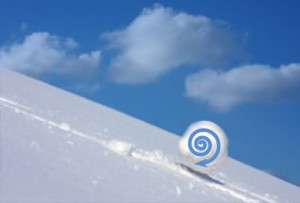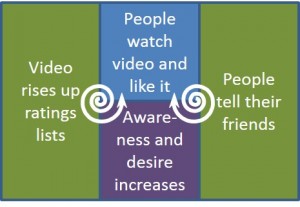 Have you ever wondered what is happening when a social media video goes viral? Viral videos are the result of self-reinforcing feedback (sometimes called the ‘snowball effect’ or ‘virtuous/vicious cycles’). If a video is sufficiently engaging, those who watch it will share it with their friends. There is a good chance the friends will also enjoy it and share it with their network of friends, and so on. Similarly, the more hits or ‘likes’ a video gets, the more likely it is to move up popularity based ranking lists which will, in turn, stimulate more hits and ‘likes’ that will drive it further up the ranking lists. So we see at least two positive self-reinforcing feedback loops driving the success of viral videos. One based on awareness generated through social media and the other based on attention generated by rising up ranking lists. Because of the multiplier effect each time around the self-reinforcing loop, rapid non-linear growth occurs.
Have you ever wondered what is happening when a social media video goes viral? Viral videos are the result of self-reinforcing feedback (sometimes called the ‘snowball effect’ or ‘virtuous/vicious cycles’). If a video is sufficiently engaging, those who watch it will share it with their friends. There is a good chance the friends will also enjoy it and share it with their network of friends, and so on. Similarly, the more hits or ‘likes’ a video gets, the more likely it is to move up popularity based ranking lists which will, in turn, stimulate more hits and ‘likes’ that will drive it further up the ranking lists. So we see at least two positive self-reinforcing feedback loops driving the success of viral videos. One based on awareness generated through social media and the other based on attention generated by rising up ranking lists. Because of the multiplier effect each time around the self-reinforcing loop, rapid non-linear growth occurs.
 My experience tells me the snowball effect is one of the most significant features of complex and emergent situations. It is one the key reasons why small initial changes (weak signals) can sometimes have unexpectedly large consequences or impacts. These, in turn, contribute to the unpredictability of such situations.
My experience tells me the snowball effect is one of the most significant features of complex and emergent situations. It is one the key reasons why small initial changes (weak signals) can sometimes have unexpectedly large consequences or impacts. These, in turn, contribute to the unpredictability of such situations.
The snowball effect (self-reinforcing feedback) is at the heart of the development of most deep personal expertise. Several feedback loops are happening in parallel:
- I develop initial expertise. This proves valuable for me in work or social settings, so I am motivated to develop the expertise further and to apply it with more confidence and more deeply. This, in turn, makes the expertise even more valuable to me, and so on.
- My expertise is noticed by others. This makes feel good and so motivates me to develop the further and apply it more widely which, in turn, increases the number of people that notice my expertise, and so on.
- The more I apply my expertise, the more I understand the nuances of the expertise and how it applies in various circumstances and this, in turn, creates more aspects that I can learn and develop (I like to think if it in terms of creating more ‘edges’ to my expertise that I can work on) which creates more and deeper opportunities to apply the expertise, and so on.
- The more I apply and develop the expertise, the more likely it is that it will come to the notice of people who can help me develop further, either through coaching or advice, or the provision of more challenging opportunities to apply it. This creates further opportunities to develop and apply the expertise, and so on.
- The more I apply my expertise, the larger the library of related patterns and associations I develop in my brain and this, in turn, increases the speed and confidence with which I can apply my expertise. This, in turn, grows the opportunities to apply my expertise which builds an even larger and more nuanced library of patterns, and so on.
As an aside, I think we see the snowball effect evident in many students that excel in a particular area. They are not learning to get a good grade, they are learning because one or more of the above self-reinforcing feedback loops have been triggered. The excellent grade is just a by-product or confirmation.
The growth and development of expertise via the snowball effect is not controlled, managed or predictable. Although the broad progression path for the type of expertise may be able to be anticipated, the specific opportunities for development are not prescribed, planned and programmed in advance. They are determined by the unfolding (emergent) situations triggered by one or more of the above self-reinforcing feedback loops.
The proceeding discussion has focused on the development of individual expertise, but I believe that it also applies to the development of capabilities at the group or organisational level. It also applies to the development of many successful product or business models. Initial success creates increased learning, exposure and reputation and that drives increased funding (sales and investors) and product improvements that, in turn, creates further success, and so on.
I believe the snowball effect (self-reinforcing feedback) is at the heart of successfully navigating many emergent and complex situations. I will explore this further in future blog posts.





Speak Your Mind